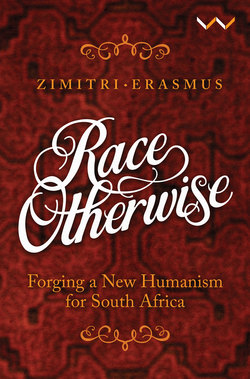Читать книгу Race Otherwise - Zimitri Erasmus - Страница 9
На сайте Литреса книга снята с продажи.
1 This Blackness
ОглавлениеInstead of denying history and fabricating a totalising colouredness, ‘multiple belongings’ can be seen as an alternative way of viewing a culture where participation in a number of coloured micro-communities whose interests conflict and overlap could become a rehearsal of cultural life in the larger South African community where we learn to perform the same kind of negotiations in terms of identity within a lived culture characterised by difference.
ZOE WICOMB
‘Shame and identity: the case of the coloured in South Africa’, 1998
... the meaning and significance of whiteness (and blackness) within a given polity at a given time [matters] ... why. take the dominant [meaning] to be definitive .
MICHAEL J. MONAHAN
The Creolizing Subject: Race, Reason, and the Politics of Purity, 2011
MY BLACKNESS IS SUPPOSEDLY visible only because I do not ‘look white’.1 But, in some parts of West Africa I am called white. My blackness is ambiguous because I am not black Black or black African. These descriptions are increasingly used to distinguish between formerly colonised South Africans with different historical relationships to this region and its colonial past. I am (more often than not) not considered African in South Africa. I am still called ‘Coloured’.2 In the Western and Eastern Cape provinces ‘what I am’, racially speaking, is seldom questioned. In Limpopo, Gauteng and Mpumalanga, the northern provinces of the country, I am asked which tribe and which country I am from. In parts of Europe I am assumed to be from a Caribbean island. African-Americans are surprised to find that I was born and live ‘in Africa’. People from different parts of the world ask ‘what mix’ I am. Which would you prefer? Salt and vinegar or cinnamon and sugar? Neither one of my parents was black Black. Neither one of them was white White.3 I am not half-and-half.
